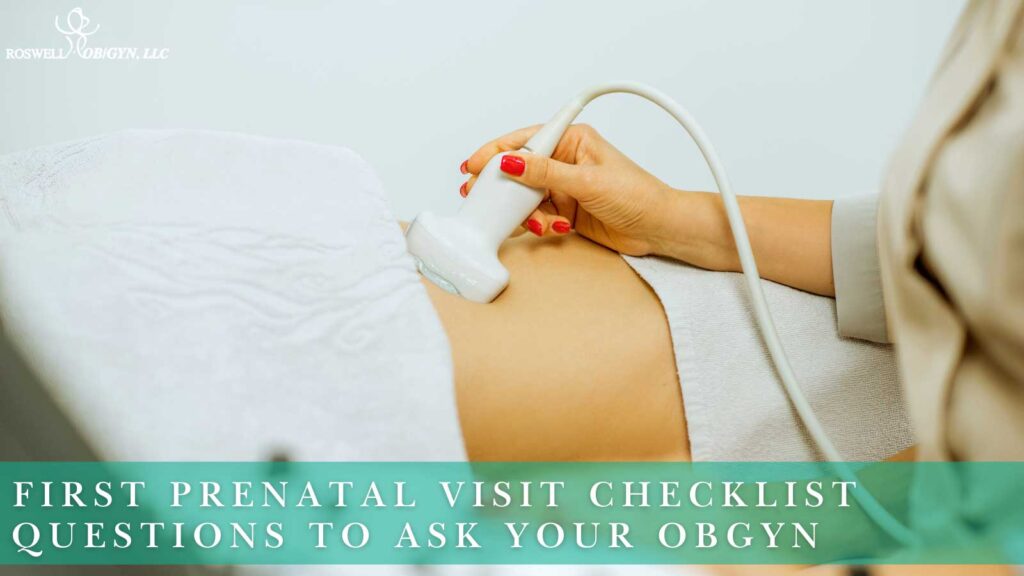
Seeing that positive pregnancy test can feel like stepping into uncharted territory. Your mind probably races with questions about what comes next, what to expect, and how to ensure the healthiest possible pregnancy.
That first appointment is your gateway to answers, guidance, and peace of mind. Having the right questions ready transforms this visit into a robust foundation for your entire prenatal care journey.
Preparing for Visit Success
Proper preparation transforms your prenatal clinic visit into a productive, informative experience that sets the stage for excellent care. Taking time to gather information beforehand ensures you make the most of your appointment.
Getting Ready Before You Go
Preparation reduces anxiety and increases your confidence during this crucial first meeting. It also ensures you don’t forget to discuss important topics.
- What specific information should I bring to my first appointment, such as a list of my current medications and dosages, my family’s medical history, and the exact date of my last menstrual period?
- Is there anything I should avoid doing before my appointment, like eating certain foods or using specific products, that could affect my test results?
- What questions are most important to ask during this first visit, especially regarding my health and the immediate next steps?
- How can I prepare my partner to participate in the conversation and offer support actively?
- What symptoms or concerns, even if they seem minor, should I mention to my provider during the visit?
Gathering necessary information beforehand makes your visit more productive and efficient while helping you feel more prepared and confident.
What Happens at Your First Prenatal Clinic Visit
Your first appointment typically happens between 8-10 weeks after your last period and usually lasts longer than a standard checkup. This comprehensive assessment establishes your entire pregnancy care plan. It includes a thorough health history review, a physical examination, and initial testing, all of which become the foundation for your personalized care.
Important Details About the Visit Process
Understanding what happens during your appointment helps you prepare mentally and know what to expect. These details ensure you’re ready for each component of your visit.
- What specific paperwork do I need to complete beforehand, and can I do any of it online?
- How long will this appointment take, and should I plan for any follow-up appointments today?
- Can my partner or a support person come with me, and is there a limit to how many people can attend?
- What should I bring to my first appointment, such as a list of my current medications or family medical history?
- What tests will be done today versus what will be scheduled for future visits?
Your prenatal doctor will use this information to gather a comprehensive picture of your health background and perform initial assessments. This forms the foundation for your personalized care plan.
Initial Testing Information
Blood work and urine testing provide crucial baseline information about your health status. Understanding what each test reveals helps you stay informed about your care and make sound decisions.
- What does each blood test check for, specifically regarding blood type, Rh factor, immunity to certain diseases like rubella, and screening for conditions such as anemia? When and how will I get my test results?
- Will I receive them through a patient portal or a follow-up call?
- What happens if something abnormal is found, and what are the next steps?
- Are there additional tests or screenings I should consider based on my age, health background, or family history?
- How often will testing be repeated throughout my pregnancy to monitor my health and my baby’s development?
Additional prenatal testing depends on your specific situation. Discussing these options early helps you make informed decisions about your care.
Essential Questions About Your Health Journey
Understanding your health profile is a crucial step in pregnancy planning. Every woman has unique circumstances that require individualized care. Asking the right questions helps you and your provider establish a comprehensive plan that addresses your specific needs and potential considerations.
Understanding Your Personal Risk Picture
Your health background shapes your pregnancy risk profile and influences the level of monitoring and care you’ll receive. This is your chance to discuss any health concerns with your provider, ensuring the safest possible pregnancy.
- What specific risks should I be aware of based on my medical background, such as a history of blood clots, autoimmune conditions, or previous pregnancy complications?
- How might my family history of genetic disorders, heart disease, or other conditions affect this pregnancy?
- Do my current medications or supplements need adjustments or discontinuation during pregnancy?
- What safe alternatives exist if changes are required?
- How will the chronic conditions I have, like diabetes, hypertension, or thyroid issues, be managed and monitored throughout my pregnancy?
These conversations ensure optimal prenatal care without gaps in treatment protocols and help you understand what symptoms might require immediate attention.
Testing and Screening Options
Genetic screening recommendations often vary based on your age, ethnic background, and family history. Discussing testing options early in your pregnancy gives you time to research and make thoughtful decisions that are right for you.
- Which genetic screenings, such as a nuchal translucency scan or non-invasive prenatal testing (NIPT), make sense for my specific situation?
- When do these different tests typically happen during pregnancy?
- What does each test reveal about my baby’s development, and how accurate are they?
- What are the estimated costs and timeline for receiving the results of recommended screenings?
- If test results show potential concerns, what are the next steps, and what resources are available to help me understand my options?
Your OBGYN can explain the difference between routine tests for everyone and specialized screenings for specific risk factors, helping you feel prepared and informed.
ALSO READ: Breast Changes During Pregnancy Explained
Questions About Your OBGYN Care Experience
Establishing clear communication channels and understanding your care team’s approach sets the foundation for a positive pregnancy experience. The logistical side of your care matters just as much as the medical aspects.
Understanding Your Appointment Schedule and Provider Availability
Understanding your appointment schedule and how your provider system is structured helps you plan effectively and ensures continuity of care throughout your pregnancy.
- How often will I be seen during my pregnancy?
- Does the frequency increase as I get closer to my due date?
- What happens at each type of appointment? For example, when will we start discussing fetal movement or birth planning?
- Will I see the same provider each visit, or will I be seeing multiple providers in the practice?
- How does your group practice model work, especially regarding who will be available to deliver my baby?
- Can I request to see a specific provider, or are appointments scheduled based on availability?
Some OBGYN clinics use a group practice model where you might see different providers, so understanding this system upfront helps set appropriate expectations for your care experience.
Emergency Support and Communication
Pregnancy symptoms don’t follow business hours, making access to support after hours crucial for your peace of mind and safety. Knowing the right way to communicate with your care team can prevent unnecessary stress and emergency room visits.
- How do I reach a provider with urgent concerns after hours or on weekends?
- Is there a specific number I should call?
- What are the most common symptoms that require immediate attention versus those that can wait until the next business day?
- What’s the best way to contact you with non-urgent questions between appointments, such as through a patient portal or secure messaging?
- How quickly can I expect responses to my non-urgent questions?
- Does your practice offer a nurse hotline or a specific online patient portal for communication and accessing my medical records?
Modern prenatal clinics often offer various communication methods, including patient portals, nurse hotlines, or secure messaging, to keep you connected with your care team.
Lifestyle Questions That Matter Daily
Your daily habits significantly impact both your health and your baby’s development throughout pregnancy. Making informed decisions about nutrition, exercise, and work requires specific guidance tailored to your circumstances. These conversations are key to a healthy pregnancy.
Nutrition and Weight Guidelines
Personalized nutrition advice considers your unique health conditions, dietary preferences, and cultural background while ensuring proper nutrition throughout your pregnancy.
Questions to ask:
- What foods, specifically raw seafood, certain deli meats, and unpasteurized cheeses, should I avoid altogether?
- What supplements, such as DHA or iron, do you recommend beyond the standard prenatal vitamins?
- How should I modify my current diet to meet the increased nutritional needs of pregnancy?
- How much weight gain is healthy for my specific situation, given my pre-pregnancy weight?
- What’s the recommended rate of weight gain each trimester, and are there particular goals I should aim for?
- What if I have specific dietary restrictions, such as being a vegetarian, or have food allergies?
Weight gain recommendations depend on your pre-pregnancy weight and overall health status, so individualized guidance from your provider can help prevent unnecessary anxiety.
Exercise and Work Accommodations
Staying active benefits both you and your baby, but guidelines vary based on your fitness level and pregnancy progression. Planning for workplace changes early can also ensure a smoother transition as your pregnancy progresses.
Questions to ask:
- What exercise activities, like walking, swimming, or prenatal yoga, are generally safe throughout my pregnancy?
- Which exercises should I modify or avoid, particularly those that involve lying on my back or a high risk of falling?
- How will exercise recommendations change as I progress from the first trimester to the third?
- When might I need workplace accommodations, such as a different chair or more frequent breaks?
- What are safe lifting limits during pregnancy, especially if my job requires physical activity?
- Are there restrictions on travel for work, particularly regarding flying in the later trimesters?
Planning these conversations with your employer and provider early helps ensure a smooth transition as your pregnancy progresses and your needs change.
Mental Health and Emotional Support Questions
Pregnancy affects mental health as much as physical health, yet emotional well-being often receives less attention than it deserves. Quality prenatal care includes comprehensive support for both your physical and emotional needs during this transformative time.
Addressing Your Emotional Well-being
Your mental state significantly impacts your physical health, your baby’s development, and your overall pregnancy experience. Having open conversations about emotional support is crucial for a healthy journey.
Questions to ask:
- How does your practice address common emotional concerns during pregnancy, such as anxiety, depression, or mood swings?
- What mental health resources are available to me within the hospital network or community?
- When should I be concerned about my mood changes, and what are the signs that I might need additional mental health support?
- Can you recommend counselors or therapists who specialize in perinatal mental health?
- How can my partner find support or resources if they are dealing with anxiety or other concerns about pregnancy and parenthood?
- What strategies or resources do you recommend for managing stress and promoting emotional well-being during pregnancy?
Understanding the available support ensures comprehensive care beyond just physical monitoring and helps you feel more prepared for the emotional aspects of pregnancy and postpartum.
Preparing for Visit Success
Proper preparation transforms your prenatal clinic visit into a productive, informative experience that sets the stage for excellent care. Taking time to gather information beforehand ensures you make the most of your appointment.
Getting Ready Before You Go
Preparation reduces anxiety and increases your confidence during this crucial first meeting. It also ensures you don’t forget to discuss important topics.
Questions to ask about preparation:
- What specific information should I bring to my first appointment, such as a list of my current medications and dosages, my family’s medical history, and the exact date of my last menstrual period?
- Is there anything I should avoid doing before my appointment, like eating certain foods or using specific products, that could affect my test results?
- What questions are most important to ask during this first visit, especially regarding my health and the immediate next steps?
- How can I prepare my partner to participate in the conversation and offer support actively?
- What symptoms or concerns, even if they seem minor, should I mention to my provider during the visit?
Gathering necessary information beforehand makes your visit more productive and efficient while helping you feel more prepared and confident.
ALSO READ: Why Prenatal Genetic Testing Might Be Right for You
Take Control of Your Pregnancy Journey
Your first appointment is more than just a medical visit – it’s your opportunity to establish a partnership that will guide you through one of life’s most incredible experiences. The questions you ask today shape the quality of OBGYN care you’ll receive for the next nine months and beyond.
Every concern matters, every question deserves a thoughtful answer, and every aspect of your pregnancy journey should be approached with the attention and expertise you and your baby deserve. Come prepared, speak up about your concerns, and establish the open communication that leads to the healthiest possible pregnancy outcomes.
Ready to start your pregnancy journey with confidence? Contact Roswell Ob/Gyn for compassionate, comprehensive care. Our experienced team provides personalized attention and expert guidance, ensuring you feel supported and informed every step of the way.



